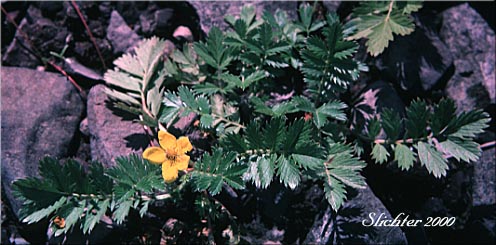

Silverweed as its name implies is a grayish-haired, tufted perennial which arises from thick, fleshy roots. The flowering stems range from 3-28 cm high and the plant has long, slender stolons which root and sprout at the nodes. The basal leaves are 10-20 cm long and pinnately compound. The 11-25 leaflets are coarsely toothed, obovate to oblong in shape, and from 1-3.5 cm long. The larger leaflets are commonly interspersed with smaller ones. The blades may be greenish above, but are commonly whitish or grayish-woolly haired on both surfaces.
The flowers are solitary at the nodes of the stolons. The calyx is silky with the sepals ovate-triangular in shape and 4-6 mm long. The 5 yellow petals are each oblong-obovate to oval in shape and 8-12 mm long. The pistils are numerous and there about 20-25 stamens.
The rhizomes of silverweed evidently taste like parsnips, sweet potatoes, or chestnuts. They may be eaten raw, but are best eaten roasted, boiled, or fried. They may also be dried for storage. The roots were collected by Native Americans during the fall months as that was evidently the time they were most flavorful. As silverweed stimulates the uterine muscle, it should not be eaten by women who are pregnant.
Silverweed is found in moist, open sites near water. Such locations include streambanks, mud flats, pond margins, and meadows.
Silverweed is found mainly east of the Cascades from Alaska south to southern California, and east to the Atlantic coast. It is also an Eurasian species.